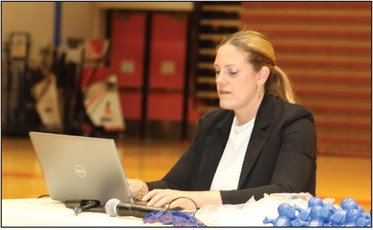It’s true that ‘one pill can killDr. Kristin Feeback
LARNED — It has been some time since Dr. Kristin Feeback has been in Pawnee County.
Dr. Feeback, a clinically licensed behavioral health professional, began her career in 1995 as a mental health technician before moving to western Pawnee County where she became a program consultant and then a clinical therapist in the Sexual Predator Treatment Program at Larned State Hospital.
A lot has happened since then.
Earlier in the week, Dr. Feeback brought back two important messages to adults and students in the Larned USD 495 school district on behalf of the district Parent Teacher Organization and Pawnee County Attorney Doug McNett from the Pawnee County Diversion Fund.
Monday evening, Dr. Feeback spoke to adults gathered at the Larned Middle School about her work as President and CEO of CommCare Behavioral Health, which lists work with the nation’s suicide prevention 988 Lifeline and its own EPIC program to fight opioid addiction and abuse as two of its programs covering 22 counties in the state of Missouri and the Kansas City Metro area in Kansas.
Tuesday morning, she delivered the same message to Larned Middle School and Larned High School students at a special assembly in the LMS gymnasium.
The 988 impact
On July 16, 2022 the federal government transitioned from its 10-digit National Suicide Prevention Line number to the three-digit 988 Lifeline. “That change came none too soon,” Feeback said. “It should have happened years ago.”
A mental health professional with more than 25 years’ experience, Dr. Feeback has spent her career in building influential relationships and building clinical and administrative capabilities. Her difficult time as a youth shaped her focus as a caring individual passionate about mental health distress treatment, community growth, and education.
“Too many people are experiencing suicidal crisis or mental healthrelated distress without the support and care they need,” she said. “Sadly, the pandemic only made a bad situation worse when it comes to mental health and wellness in America.”
In 2020, the country suffered from one death by suicide “every 11 minutes,” she said. And in 2021, “For people aged 10-14 and 25-34, suicide was the second leading cause of death.” More than 105,000 people died from drug overdoses and nearly 900,000 aged 12-17 and 1.7 million adults attempted suicide, she said.
The 988 hotline connects individuals in crisis with a mental health professional to address immediate needs, she said. “Too many times suicidal persons wind up in the emergency room,” she said. “But the ER isn’t the place for someone who is in a mental health crisis. It’s there for physical emergencies, not mental ones.”
The 988 number assures 24/7 availability and rapid access to crisis services through call, chat or text. In CommCare’s catchment area, contact also includes mobile response teams armed with GPS and follow-up contact following the first call. “The crisis response teams are deployed to wherever the person in crisis is located,” she said. “The crisis can be resolved and care provided in the least restrictive setting possible.
“A side benefit is that we can reduce use of law enforcement, public health and other safety resources,” she noted.
Work in progress
Dr. Feeback noted that in Kansas, the system is in place for metro areas but is still a work in progress for rural parts of the state. “We currently have three call centers in place in Kansas and are working on a fourth,” she said. Most rural callers will reach the call center established in Wichita.
In its first year, 988 answered nearly 5 million calls in 2023, she said.
Fentanyl and opioids
Dr. Feeback also gave the groups information regarding opioid abuse and addiction, along with a short video and some current statistics. The dangers are real and the concern is warranted, she said. “As a parent I can tell you that you should never assume that your kids would never get involved in something,” she said. “You make think it isn’t a problem, but it’s now. You may say that it happens in big cities, not small towns, but it’s here.
“You can think that it might happen to somebody else and not you, but it can, and it does.”
She recommended that parents take measures, such as storing their prescriptions in a lockbox.
“It only takes once,” she said. “It’s true that ‘one pill can kill.’”





